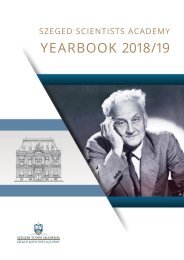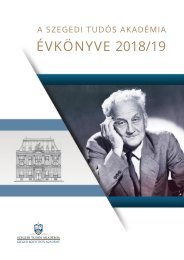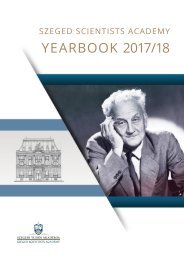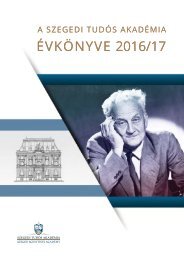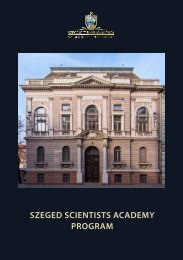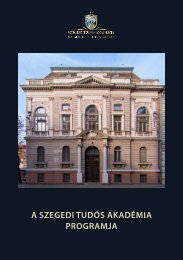SzSA YearBook 2016/17
Create successful ePaper yourself
Turn your PDF publications into a flip-book with our unique Google optimized e-Paper software.
SZENT-GYÖRGYI MENTORS<br />
LAJOS HARACSKA<br />
Mutagenesis and Carcinogenesis Laboratory,<br />
Institute of Genetics,<br />
Biological Research Center of the<br />
Hungarian Academy of Sciences<br />
Address: Temesvári krt. 62., H-6726 Szeged, Hungary<br />
E: haracska.lajos@brc.mta.hu<br />
T: +36 62/599-666<br />
RESEARCH AREA<br />
Stalling of the DNA replication machinery, which occurs as<br />
a consequence of encountering unrepaired DNA damage,<br />
is a challenge for cells. To rescue the stalled replication fork,<br />
different DNA damage bypass mechanisms have evolved<br />
that promote replication through DNA lesions. In humans,<br />
increased error-prone bypass of DNA lesions causes increased<br />
mutagenesis and, as a consequence, a rise in the<br />
incidence of cancers. Error-free bypass processes, by contrast,<br />
keep mutagenesis low and reduce the frequency of<br />
cancers. Our research laboratory is interested in the driving<br />
forces and molecular mechanisms of mutagenesis and<br />
carcinogenesis. In particular, we investigate the following<br />
questions: What are the common roots of evolution and<br />
carcinogenesis? What are the molecular mechanisms of<br />
chromosomal rearrangements and the formation of point<br />
mutations? Why do we observe increased genome instability<br />
during carcinogenesis? What is the role of the recently<br />
described DNA repair genes in cancer suppression? Why<br />
do mutations in certain genes predispose to cancer? Which<br />
genes are commonly mutated in cancer, and how do these<br />
mutations contribute to tumour development and drug resistance?<br />
We investigate these challenging problems using<br />
human tissue culture-based reporter systems, next-generation<br />
DNA sequencing and purified proteins in reconstituted<br />
reaction pathways. Our research provides more insight into<br />
the molecular events of genome instability, carcinogenesis<br />
and has the potential to identify new tumour markers and<br />
drug targets as well as to improve personal cancer treatment.<br />
TECHNIQUES AVAILABLE IN THE LAB<br />
Next-generation DNA sequencing, PCR, qPCR, protein microarray,<br />
human tissue culture-based reporter assays such as<br />
cell survival, mutagenesis, homologous recombination and<br />
various tests, confocal microscopy-based techniques such<br />
as protein localization, DNA replication and chromosomal<br />
rearrangements, protein overexpression and purification,<br />
immunological assays, biochemical enzyme assays, and<br />
yeast genetic methods.<br />
SELECTED PUBLICATIONS<br />
Mórocz, M., Zsigmond, E., Tóth, R., Enyedi, M.Z., Pintér, L.,<br />
Haracska, L. (20<strong>17</strong>) DNA-dependent protease activity of<br />
human Spartan facilitates replication of DNA-protein crosslink-containing<br />
DNA. Nucleic Acids Res 45: 3<strong>17</strong>2-3188.<br />
Chen, J., Ai, Y., Wang, J., Haracska, L., Zhuang, Z. (2010)<br />
Chemically ubiquitylated PCNA as a probe for eukaryotic<br />
translesion DNA synthesis. Nature Chem Biol 6: 270-2.<br />
Blastyák, A., Pintér, L., Unk, I., Prakash, L., Prakash, S.,<br />
Haracska, L. (2007). Yeast Rad5 protein required for<br />
postreplication repair has a DNA helicase activity specifi c<br />
for replication fork regression. Molecular Cell 28: 167-75.<br />
Johnson, R.E., Washington, M.T., Haracska, L., Prakash,<br />
S., Prakash, L. (2000) Eukaryotic polymerases ι and ζ act<br />
sequentially to bypass DNA lesions. Nature 406: 1015-1019.<br />
Haracska, L., Yu, S.L., Johnson, R.E., Prakash, L., Prakash, S.<br />
(2000) Efficient and accurate replication in the presence of<br />
7,8-dihydro-8-oxoguanine by DNA polymerase η. Nat Gen<br />
25: 458-461.<br />
49






